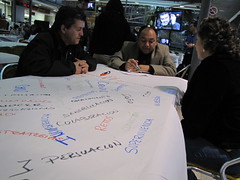Como anuncié hace algunas semanas, fui invitado para ofrecer un curso dentro del programa de maestría en ingeniería de la Universidad EAFIT (Colombia). El curso, que tiene como nombre Grupos, redes y comunidades (GRYC09), tardó en iniciar más tiempo de lo que yo me imaginaba (se suponía que arrancaba en paralelo con ELRN09), lo cual al final fue una afortunada situación, pues su arranque se beneficia de muchas lecciones aprendidas en estas semanas.
Como decía hace algunos días. este curso apareció de manera un poco súbita pero muy oportuna, y explora algunos conceptos básicos sobre grupos, redes y comunidades y las formas en las cuales la tecnología incide en estas organizaciones, así como ideas sobre su diseño y gestión. Lo interesante es que, a pesar de ser también un curso abierto, la tecnología no es en sí misma objeto de estudio (al menos no al nivel de ELRN09), lo cual me llevó a preguntarme acerca de la relevancia de un esquema como el que ya estoy implementando.
Hay dos elementos aquí: Empieza a hacerse claro para mi (si no lo tenía claro antes), que la infraestructura tecnológica que estoy usando no tiene que ver con el tema de un curso, sino con una forma diferente de hacer las cosas, que de hecho puede ser difícil para muchos de nosotros (no deja de sorprenderme la necesidad que tenemos de contar con un "profesor" que nos diga qué hacer y si estamos en lo 'cierto' o no), y que en realidad tiene unas fuertes implicaciones en lo que se entiende como responsabilidad de las instituciones de educación superior (y de los docentes) frente a la difusión del conocimiento (algo de esto ya apareció en la conversación con Miguel Angel).
Segundo, hay una diferencia sustancial cuando hay un "temario" que debe ser cubierto, como en el caso de GRYC09. En ELRN09 podemos darnos "el lujo" de mantener cierta incertidumbre sobre las actividades, pues finalmente vivir el proceso constituye una parte importante de entender de qué se trata el e-Learning. En GRYC09 es distinto, pues terminé enfrentándome con la necesidad de tener un "mínimo" de temas que debían ser abordados. En esa medida, el asunto se volvió un reto. ¿Cómo mantener la apertura en la exploración y la reflexión, y 'cubrir' el tema?
No estoy seguro de que la solución que estoy proponiendo sea la más adecuada. Sin embargo, sí me gusta sentir que estoy conservando hasta cierto punto la intención de permitir a cada aprendiz explorar lo que resulte más relevante para su situación personal. De cualquier manera, es un experimento más, sobre el cual sin duda aprenderé mucho más.
Hay un detalle que viene a mi mente (ya no sé si lo he mencionado antes o no), y es esta noción de 'experimento'. Una reacción completamente válida al respecto, desde el punto de vista del estudiante, sería cuestionar por qué tiene él que hacer parte de un experimento (después de todo, ¿quién pagaría por ser parte de un experimento?). El asunto es que tal reacción supondría que 'hacer lo mismo de siempre' tiene sentido, en la medida en que ya se ha probado y es a lo que estamos acostumbrados. En otras palabras, tal reacción supone que el 'status quo' funciona.
Y, aunque puedo estar equivocado, me temo que no funciona tanto como debería. O mejor, funciona sobre la base de ciertos propósitos implícitos (ocultos en las relaciones de poder y en las estructuras organizacionales), que a mi juicio se quedan cortos frente a lo que debería estar haciendo la educación. Por otro lado, no está de más recordar que buena parte de la historia de la humanidad ha consistido en una serie de retos al status quo, de experimentos que lo transforman y, en algunos casos, terminan por volverse un nuevo status quo.
De aquí la importancia de los experimentos. Aunque no soy un observador objetivo, me pregunto si no será preferible un experimento que genere nuevas posibilidades (incertidumbre) a un entorno 'seguro' en donde hacemos menos de lo que podríamos, sólo porque estamos familiarizados con él (certidumbre). Si me preguntan, me quedo con el primero, y por eso prefiero recordar que estos cursos son simples experimentos.
Pero en fin, terminé hablando de otras cosas. Si usted está interesado en hacer parte de GRYC09, puede encontrar más información en http://gryc09.pbworks.com/. Allí está publicada la información detallada del curso, y las actividades para estos primeros días. Como en el caso de ELRN09, la diversidad resulta MUY bienvenida!
No está de más agradecer desde aquí a la Universidad EAFIT, y a personas como Claudia Zea y Patricia Toro, que han sido lo bastante arriesgadas como para permitir la realización de este experimento. Gracias a ellas y a quienes ya se han animado a hacer parte de esta aventura!




